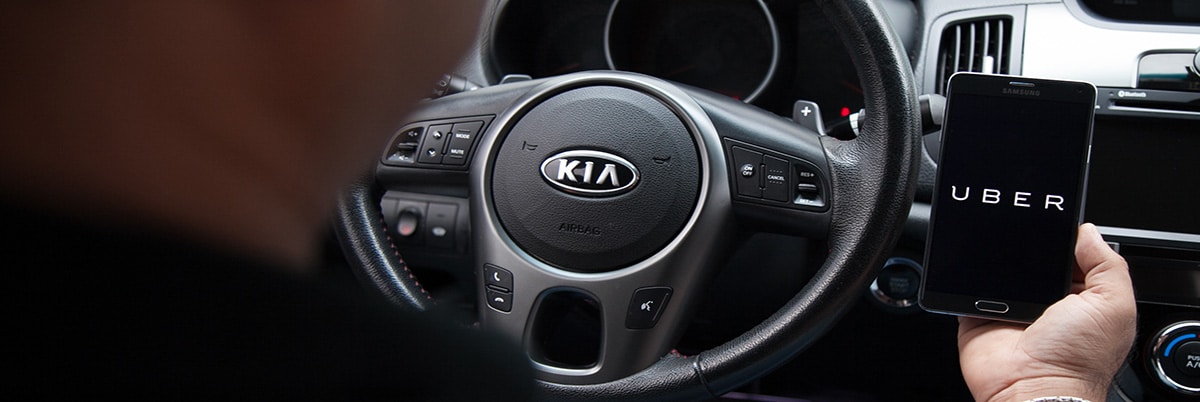
Colorado Workers’ Compensation for Rideshare Drivers
Learn about your options for recovering compensation if you were injured while driving for Uber or Lyft
Once a niche market, ridesharing has become an industry worth $85.8 billion. The two major ridesharing companies, Uber and Lyft, offer all kinds of perks to those who sign up as drivers. These include the flexibility to make your own hours, work in your choice of neighborhoods, and get paid several times per day.
There are downsides to the careers of Uber and Lyft drivers, however. The biggest example is how compensation works after an accident or injury. If you’re considering a job in ridesharing, you’ll want to know in advance about this potential drawback.
What are some common injuries to Uber/Lyft drivers?
There are hazards associated with a job as a rideshare driver, especially if you’re doubling as a delivery person for a company like Uber Eats and not just transporting passengers through Uber itself. Here are a few of the most common ways that Uber and Lyft drivers get hurt on the job:
- Car accident injuries. Rideshare accidents can range from simple fender-benders to catastrophic and even fatal crashes. Just like any job that involves being on the road, rideshare drivers are at risk for car accidents and all of their associated injuries, including:
- Whiplash
- Broken bones
- Neck and spinal trauma
- Traumatic brain injuries
- Repetitive strain injuries (RSIs). A repetitive strain injury (like carpal tunnel syndrome) is a type of injury caused by constant and repeated motion with the same muscles. These typically affect drivers in the neck, shoulders, back and feet. RSIs can cause everything from pain and immobility to tingling and numbness.
- Injuries from violence. As a driver, you’ll have frequent contact with the public, and this includes the possibility of sharing a vehicle with someone angry, intoxicated or just plain unstable. There have been many instances of violent altercations in Uber and Lyft vehicles. Some have even resulted in murder.
Are Uber drivers considered employees or independent contractors?
If you’re a rideshare driver, you’re an independent contractor. This means that you might work through Uber or Lyft, but you aren’t considered their employee. Here are just a few of the key differences:
- Taxes. As an employee, you have taxes withheld from your paychecks. As an independent contractor, no taxes are withheld, but you have to pay self-employment taxes.
- Benefits. Employees are entitled to workplace benefits, including workers’ compensation benefits, after an injury. Independent contractors receive no benefits.
- Pay and schedule. Employees work for set hours and wages. Independent contractors usually work on a task-to-task or project-to-project basis with variable and negotiable contracts.
Are rideshare drivers entitled to workers’ comp benefits in Colorado after an injury?
Can Uber drivers get workers’ comp?
Not usually. Since rideshare drivers are independent contractors, they aren’t legally classified as employees, which means that they aren’t eligible to receive workers’ compensation benefits.
However, depending on the circumstances of your accident, you may be able to file a personal injury lawsuit against a negligent driver or a third-party lawsuit against a manufacturer if a defective part contributed to your accident. An experienced car accident attorney can help you explore your legal options for recovering compensation.
Mack Babcock represented injured Lyft driver in workers’ comp case
Lyft driver Drew Wajnert’s life changed forever when a car accident left him in extreme pain, with mounting medical bills and unable to work.
Wajnert was working as a full-time Lyft driver when, shortly before 9:00 p.m. on March 2, 2021 he was rear-ended by a suspected drunk driver who was traveling 85 mph.
According to Wajnert:
I spun into the concrete divider at 50 miles an hour, and then spun to the shoulder to a dead stop.
The impact fractured his spine. Emergency responders were on the scene in minutes and transported him to St. Anthony’s Hospital. Doctors performed surgery to implant a titanium plate and 4 screws in his neck, but he was ultimately left paralyzed below the neck.
Wajnert filed a personal injury lawsuit against the suspected drunk driver, who was charged with vehicular assault. In addition, Mack Babcock worked closely alongside Wajnert’s other attorney, Kurt Zaner, to help him fight for workers’ compensation benefits.
Tragically, after spending months trying to recover at a spinal cord injury rehab center, Wajnert died from complications of pneumonia.
Beyond the courtroom: Mack Babcock’s reflection on justice and loss in Drew’s story
Drew never recovered from the destruction of his life. He was a free spirit who lived on the fringes of society with intention. His spirit could not be tied down, and the arrangement with Lyft allowed him to be the true essence of himself.
The destruction that left him limited to a chair, confined to a nursing home, was a mountain that was too high to climb. Drew passed away as a result of his injuries and what I believe was a “broken spirit.”
He is at peace now. For that, I am thankful.
Drew’s story is a reminder of what people say all the time – “every day is a gift; that is why they call it the present; be mindful; live every day like it is your last.”
Can workers’ compensation help?
In most situations involving work-related car accidents, injured employees are eligible for workers’ compensation benefits. However, time and time again, we’ve seen that rideshare companies like Lyft and Uber commonly dispute providing such benefits, instead arguing that their drivers are independent contractors and, therefore, ineligible for such benefits.
Sadly, this was also true in Wajnert’s case:
“I’m fighting as best as I can, but I am hospitalized and Lyft really isn’t doing anything for me,” he told Insider.
Lyft drivers are considered independent contractors. This classification doesn’t offer much protection for drivers like Wajnert. Ridesharing companies like Lyft do this to avoid any financial and legal liabilities when their employees are injured on the job. As you can imagine, these types of accidents often turn into an insurance nightmare.
What about auto insurance?
Normally, if an insured driver is in an accident in Colorado, they can file a claim with the at-fault driver’s insurance company. If the driver needs to file a claim with their own insurer, for example, because the at-fault driver is uninsured, things get more complicated.
There’s a lot of gray area when a driver is en route to pick up a passenger, which was what Wajnert was doing at the time of the accident, since insurers commonly won’t provide coverage for accidents that occurred while the driver was using their vehicle for “commercial” purposes.
If an insurance company learns that one of its policyholders was driving for a ridesharing company at the time of the crash, they may decline coverage.
What insurance policies do rideshare companies have?
Part of the cause of contention in Wajnert’s case was timing.
Prior to the pandemic, Lyft had UM/UIM policies that covered Colorado drivers. But those policies were dropped on March 31, 2020, and Wajnert never heard a word from Lyft.
“If this happened a year and a half ago, Drew would be able to make a claim with Lyft’s underinsured policy, most likely,” Zaner said.
According to Wajnert, the company didn’t clearly communicate that they were dropping coverage. If they had, he said, he would’ve looked into getting coverage himself, which might’ve covered him when he was hit by the drunk driver in Lakewood.
Colorado workers’ compensation lawyers are on your side
If you or a loved one was injured in a work-related car accident, you’re not alone. Drivers like Wajnert who are injured on the job deserve fair compensation. That’s why it’s important to contact an experienced Colorado accident lawyer who can help.
Rest assured that The Babcock Law Firm will always fight on your behalf to get the most compensation possible after your accident. Contact our offices today for your free initial consultation.
4 situations when a third party is liable in a car accident
Learn when a third-party claim may be possible after a car crash in Denver.
Whose insurance pays if a rideshare driver causes an accident?
If a rideshare driver causes an accident, whose insurance covers the costs? Is it the responsibility of the rideshare driver or the rideshare company?
The short answer is that it depends on the “phase” that your incident falls under if you’re a rideshare driver:
- Phase 1. Your rideshare app is turned off, and you aren’t currently working. These accidents are covered by your personal auto insurance.
- Phase 2. Your app is turned on, and you’re on duty but not currently transporting a passenger. These accidents are covered by the rideshare company’s insurance and their third-party liability protection up to a limited amount. However, Uber does not cover the Uber driver’s property damage or injuries.
- Phase 3. Your app is turned on, and you’re transporting a passenger at the time of the accident. The rideshare company’s insurance will offer uninsured/underinsured coverage, contingent collision and comprehensive coverage, and third-party liability coverage. Unlike in the other phases, this coverage will also apply to the Uber driver as long as they aren’t responsible for the accident.
If you’re a rideshare passenger, these phases don’t apply. If you’re injured in an accident while being transported by a rideshare driver, you would file a claim against their insurance just like any other accident. They can sort out whether to apply their company-provided insurance or their own “regular” car insurance. If the accident is the fault of another driver, you would do the same—file a claim against their insurance as you would for any other type of crash.
Colorado car insurance guide: Everything you need to know about state requirements
Understand what minimum auto coverage really means in Colorado.
Receiving compensation through a personal injury claim
What if I’m injured on the job as a rideshare driver through no fault of my own?
If the other driver was at fault, then your best bet is a personal injury lawsuit. This is when you sue another party because their negligence caused your injury. For example, if you’re hurt in a car accident while driving for Uber or Lyft, you can sue the other driver. It wouldn’t be a workers’ compensation claim, but it could net you similar or even better benefits in the end.
How do you prove fault in Colorado?
Fault is established in Colorado by proving negligence. There are 4 elements to negligence:
- A duty of care
- A breach of that duty of care
- Causation of injuries
- Damages suffered because of the injury
To put it simply, you’ll argue that the other driver breached their duty of care by not following the rules of the road, and you’ll offer proof that you got hurt because of their negligence.
What is modified comparative fault, and how does it impact personal injury cases in Colorado?
The comparative fault rule is a legal principle that weighs how much each party is responsible for an accident. Their compensation for damages is then adjusted accordingly.
In Colorado, car accidents are judged against something called the 50% bar rule. This means that plaintiffs can only receive damages if they’re determined to be less than 50% at fault for an accident.
What’s more, your compensation is reduced based on whatever percentage of fault you’re assigned. So if a judge determines you were 25% at fault for an accident, your final compensation would be reduced by 25%. If you’re at 51% fault or higher, you’ll get nothing at all.
What type of compensation is available through a personal injury lawsuit if you can prove the other driver is at fault?
If you’ve suffered Lyft or Uber injuries, you might be entitled to several types of compensation, including:
- Economic damages. These include medical bills, car damage and lost income, including future lost income.
- Non-economic damages. These include compensation for nonmonetary losses like pain and suffering, emotional distress and loss of companionship.
- Punitive damages. These are given in rare circumstances as a form of punishment to the other party, often for intentional wrongdoing.
Help your lawyer help you
Learn what you can do to maximize the value of your personal injury case.
How to get compensation after a rideshare accident in Colorado
If you’re a rideshare driver trying to recover compensation through a personal injury lawsuit, here are the steps to take:
- Seek medical attention to establish proof of your injuries and prevent them from getting worse.
- Keep a record of all your medical bills and property damage expenses.
- Limit phone conversations and e-mail correspondence with an insurance adjuster until you speak with an attorney.
- Talk to a personal injury attorney who can help you gather proof, establish fault, perform well during insurance investigations, and maximize your chances of a settlement.
- File a personal injury claim with the court within 3 years of the accident.
It’s a straightforward process, but there can be a lot of details and deadlines to navigate, so it’s definitely worth hiring a personal injury lawyer to increase your chance of success.
Contact a Colorado car accident attorney
If you’ve been injured in a rideshare accident in the Denver area because of someone else’s negligence, contact the experienced personal injury attorneys at The Babcock Law Firm. Our attorneys are committed to helping injured Coloradans get the compensation they need after an accident while they recover from their injuries. Let us handle the negotiations with the insurance company so you can focus on healing.
Contact us today for a free consultation of your case.




